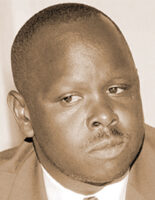
Among the youthful and energetic politicians tasked with warding off opposition to the dominant KANU party in the Rift Valley region was Isaac Kiprono Ruto, who was Minister for Vocational Training towards the end of President Daniel arap Moi’s tenure in 2002. He was 34 years old when he was appointed to the Cabinet.
Born in Uasin Gishu District, (now Uasin Gishu County), his family moved to Chepalungu in the former Bomet District in the 1980s. Ruto was elected Chepalungu Member of Parliament in 1997 to become one of Moi’s point men in South Rift Valley. Between1998 and 1999, he was the Assistant Minister for Education, and later moved to the Ministry of Agriculture in the same capacity until 2001 when he became a minister.
After the Bomet MP, Kipkalya Kones, was relieved of his duties for associating with the Opposition, Ruto was promoted to Minister for Vocational Training in 2002. As a politician and by his appointment, he was expected to ensure that the Opposition and the Kones influence came to nothing in the region that was traditionally a KANU stronghold. KANU was concerned that Kones was moving the Kipsigis ethnic community’s loyalty to the Opposition, which was not in Moi’s interests. Kones was a very influential person in the region and had teamed up with the James Orengo-led Muungano Wa Mageuzi and later with Simeon Nyachae’s Forum for the Restoration of Democracy (FORD)-People party, where he became his running mate in the 2002 General Election.
Moi also wanted Ruto to campaign for Uhuru Kenyatta, whom he saw as his successor for the presidency.
“When Kones left KANU for the Opposition after differing with Moi over land allocations in the Mau Forest among other things, Moi wanted Ruto to ward off any opposition in Bomet, which was Kones’s backyard,” said Patrick N’gerechi, once the Mayor of Bomet. According to him, Moi feared that KANU would lose support in Bomet and in Kericho because Kones was known for his mobilisation skills.
“Moi banked on Ruto’s ability to take his opponents head on and because he was youthful, he would cut the Kones influence and draw huge support for KANU and its candidate, Uhuru Kenyatta,” said Ng’erechi.
In his new role as a Kipsigis political fixer, Ruto spent most of his time campaigning for KANU and Uhuru, and failed to concentrate on his Chepalungu seat, which led to his defeat at the hands of a man he had beaten in 1997, John Koech.
“Moi wanted an aggressive person to check on opposition in Bomet and beyond. Koech was not thought to be equal to the task and Moi condequently sought his replacement,” said Ng’erechi.
Surprisingly, Ruto became an MP and the common perception was that Koech, a grassroots mobiliser, was rigged out.
Known for speaking his mind, Ruto studied political science at the University of Nairobi (UoN) but was once expelled for student activism. In 1982, when a number of soldiers from the Kenya Air Force attempted to overthrow Moi’s government, he was detained along with other UoN students for supporting the abortive coup d’état. After several interventions by politicians and parents, Moi pardoned the students and they were released to continue with their education.
Before the 2002 General Election, Ruto differed sharply with Moi shortly before the end of a two-day State tour of South Africa over the electability of Kenyatta and Kipsigis politics in general. The President abandoned him at a South African airport and Ruto had to return to Nairobi on a commercial airline. When asked why he was left behind, Ruto, who later patched up his differences with Moi, said it was a small difference not worth discussing with the media.
Those who know the former minister say he had a knack for differing with even those close to him.
“He is somebody you cannot easily convince to change his mind once he has formed an opinion on a matter,” said Chepkebit Mibei, a former Kericho KANU Branch chairman.
Mibei noted that Ruto would differ with Moi, parliamentarians and even his Cabinet colleagues over issues he held close to his heart. His saving grace was that he did not hold grudges. Mibei felt that Moi tasked Ruto to keep opposition politics out of Kipsigis because there was nobody else to do it. “His trusted lieutenants like Isaac Salat and Jonathan Ng’eno had recently passed on. Others were considered lightweight,” he said.
After staying five years out of Parliament and out of any positions of influence, Ruto beat Koech in the 2007 General Election and held the Chepalungu seat until 2013, when he became Governor of Bomet County.
Between 2008 and 2013, he was a member of the parliamentary Administration of Justice and Legal Affairs Committee and the Select Committee on Constitutional Review, supporting the formulation of the draft Constitution of Kenya, which included strong provisions for a devolved system of governance that was approved by 67 per cent of Kenyans in the August 2010 referendum.
